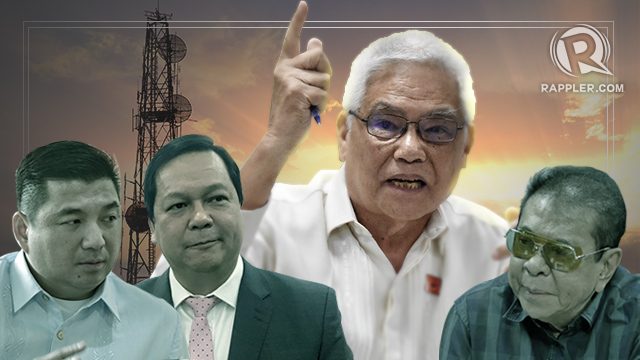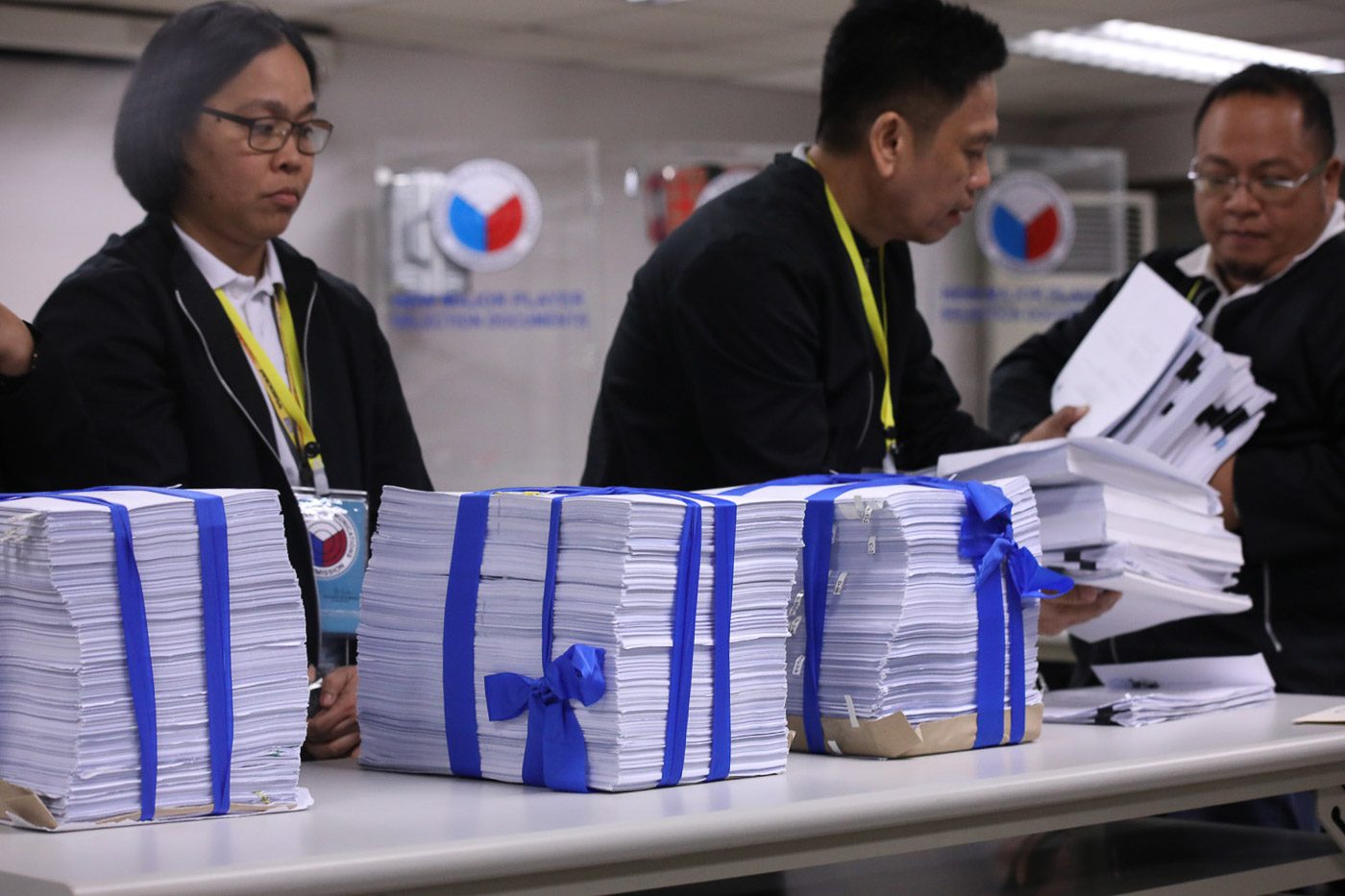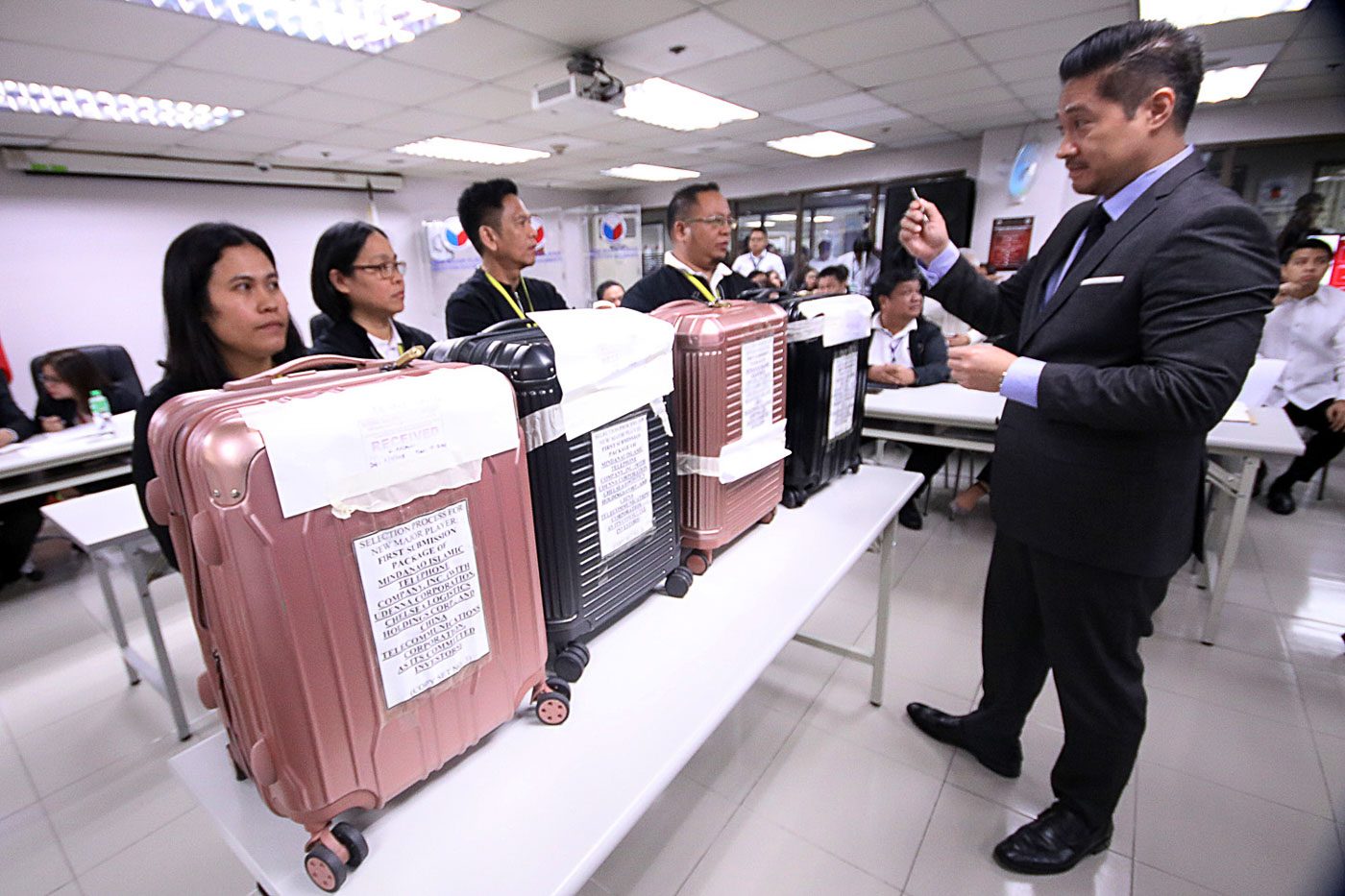SUMMARY
This is AI generated summarization, which may have errors. For context, always refer to the full article.

MANILA, Philippines – The bidding for the 3rd major telco player in the country was reminiscent of a teleserye drama here and there, with romantic promises and unexpected twists.
The race for 3rd was supposed to be the end of the long road for the next major player, but it’s shaping up to be just the 1st chapter of a saga that people have to watch closely.
Was it exciting as people anticipated it to be? Yes, no, maybe. It’s up to the audience, really.
While it was a spectacle, it lacked the highly-anticipated characters who were expected to shake up the duopoly of Smart and Globe.
Wanted: foreign players
Department of Information and Communications Technology (DICT) Acting Secretary Eliseo Rio Jr repeatedly teased that a “beauty pageant” would commence on November 7.
Local and foreign companies were expected to fight tooth and nail by showing off the best speed, coverage, and dizzying cash.
Many expected that 10 companies would rumble for the coveted crown, but only 4 showed up on the big day – with one contender who came in style and boasted of its financial arsenal.

Rumors were finally confirmed when officials of Dennis Uy’s Udenna Corporation and its subsidiary Chelsea Logistics showed up with China Telecom executives.
Meanwhile, local players who showed up in the arena were Philippine Telegraph and Telephone Corporation (PT&T) and the Chavit Singson-led consortium called Sear.
Another local player, NOW Telecom, also came in with bid documents. However, it pulled out from the competition as it was supposedly advised by its lawyers not to bid in light of its pending case against the National Telecommunications Commission (NTC).
All eyes were on the elevator, as reporters and cameramen waited for who else would show up and submit their bids.
But when the clock hit the 10 am deadline, foreign contenders like Telenor, Mobiltel, and Korea Telecom (KT) were nowhere in sight.
KT and its what-could-have-been partner Converge ICT, handed out press releases that day, saying that the conditions imposed for the bid rendered the venture “commercially unviable.”
Meanwhile, Mobiltel cited “uncertainties” which would expose investors to risks. They also had issues with the selection process and foreign ownership restrictions.
Chinese spectacle
Udenna and China Telecom were definitely out for the kill.
Their tandem called Mislatel was named after their partner Mindanao Islamic Telephone, which had a congressional franchise required for the bid.

China Telecom officials brought with them stylish luggage containing the bid documents. Suitcases came in rose gold and metallic black. The bid documents of other contenders were put in small balikbayan boxes only.
When the NTC selection committee assessed the requirements, they disqualified PT&T and Sear.
PT&T lacked the certification of technical capability, while Sear did not have the participation security of P700 million ($13.2 million). Their proposals were not even scored due to their deficiencies.
Despite only one contender qualifying for the bid, the selection committee went on with the process and opened the bags.
The documents were tied with blue ribbons, another nod to the Chinese style.
It took hours to scrutinize the documents, but the image was starting to be clear: Mislatel would bag the provisional 3rd telco slot.
“Get it over with already, we know they’re winning that anyway,” a reporter jokingly whispered.
When the selection committee finally declared Mislatel the winner, their executives applauded and exchanged hugs.
Udenna’s public relations team then handed out a press release, as if already anticipating their win.
With the two contenders disqualified, only Mislatel’s promises were made public: internet speeds of 27 Megabits per second (Mbps), a national coverage of 84% after 5 years, and a whopping P257 billion ($4.8 billion) in capital expenditures. Their promised internet speed would surpass even the global average of 22.61 Mbps.
They promised to outpace the duopoly, which had speeds of only 10 Mbps at most on average, covered less than 70% of the national population, and spent less than P50 billion ($940 million) yearly.
Romantic promises
Promises are good, but how will Mislatel fulfill them?
Tycoon Manny Pangilinan welcomed the entry of the 3rd telco player, but questioned how Mislatel would be able to slay his dynasty PLDT-Smart and competing empire Globe.

“In respect to the first year, I think the impact would not be significant…impact on the market [and] on the revenue profile, because we are assuming the 3rd telco will have to build the relevant infrastructure,” Pangilinan said in a press briefing on Thursday, November 8.
“They will have to look for sites for their towers, their antennas, and as you know, that takes a lot of time. For matured players like us and Globe, we roll out, complete 300 sites per year,” Ray Espinosa, PLDT chief corporate services officer, said.
Meanwhile, NOW Telecom and its mother company NOW Corporation reiterated their complaint against the selection criteria: the lack of a rollout plan.
NOW said that it would be “inappropriate” if the rollout plan is submitted only after a company is declared the 3rd telco player.
The company said a clear rollout plan ensures the “fairness and soundness” of the selection process.
The terms of reference (TOR) say that if Mislatel fails to fulfill its commitments, it would be penalized. The company would lose 10% of its committed capex or P25.7 billion ($480 million) and even more should it break its promises.
However, a businessman with one of the deepest pockets in the country hinted that the penalties won’t really hurt Mislatel, thanks to China Telecom’s cash.
“Do the math,” the businessman said.
China Telecom’s income stood at a whopping $18 billion in 2017 alone, equivalent to almost P1 trillion.
The businessman said that the cash losses would only be painful in the medium term and securing the 3rd telco slot would be profitable “eventually.”
The businessman even went on to ask, “Is China Telecom really here for the profits?”
Conspiracy theories on China and how it links with Uy, a campaign donor of President Rodrigo Duterte, already abound.
Legal saga, leadership drama
The two disqualified bidders are not backing down and are determined to throw legal spears to overthrow the winner.
Perhaps the more aggressive is Singson’s Sear Telecom, which argued that the winning consortium “misled” the public.
Singson claimed that Mislatel has an exclusive contract with DigiPhil, a subsidiary of TierOne Communications, which is part of the Sear consortium.
He even insisted that they would win the bid if the NTC reconsiders their proposal.
However, Mislatel refuted Singson’s claims and insisted that the contract was terminated last October 5. Moreover, the contract was only meant for “small projects” and not for the purpose of the 3rd telco player slot.
Should Singson prevail, Mislatel would lose some P700 million ($13.2 million) in participation security.
Sear would then face the same set of questions on the rollout plan. It promised 100% coverage just on its 1st year of operations – something both Smart and Globe were unable to do for decades.
Despite the controversies and lack of qualified participants, observers commended the bidding process.
“From the drafting of the memorandum circular down to the opening and evaluation of the bid, all aspects were shown to us,” Better Broadband Alliance lead convener Mary Grace Mirandilla Santos said.
Both Mobiltel and KT voiced their concerns against the TOR only on the same day as the bidding process.
Moreover, PT&T and NOW Corporation only filed cases against the NTC just days before the big day.
If the TOR were really transparent, why did the bid come down to just 3 bidders and enough for most companies who bought bid documents to back out?
And for the potential bidders who backed out: why were they silent about their concerns and why did they decide to air these only on the same day of the bid?
Companies were mum and evaded the media during public consultations. This was perhaps their missed opportunity to harness the power of public opinion, shake up the conversation, and put more pressure on government regulators.
Moreover, these last-minute developments seem to indicate that the bidding for the 3rd telco was rushed just to satisfy the President’s marching order to name a new player before the end of 2018.
And if the process were really transparent and deserved commendation, why is Rio not getting enough praises from Malacañang? Why is he, an electronics and communication engineer who placed 4th in the licensure exams, being booted out and replaced by Senator Gringo Honasan?
What business does Honasan, a military man who supposedly does not even use a modern smartphone, have in the DICT?
The rushed pace of the bid and the controversies surrounding it raise multiple questions that beg for satisfactory answers. – Rappler.com
P53.13 = $1
Add a comment
How does this make you feel?
There are no comments yet. Add your comment to start the conversation.